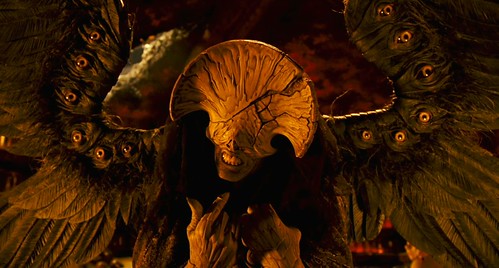 "If only Ridley had cast me instead of Bloom in Kingdom of Heaven, it might have been worth watching."
"If only Ridley had cast me instead of Bloom in Kingdom of Heaven, it might have been worth watching."Body of Lies
4/5
I was excited about Body of Lies more than a year ago, when it was an IMDb page with a different title. The combination of one of my favorite directors, Ridley Scott, with his man-muse Russell Crowe, was enough to get excited about. Throw in a newly-excellent Leonardo Dicaprio, a script by William Monahan (writer of The Departed), and hefty doses of violence, and you've basically got the perfect movie.
Well, Body of Lies is far from perfect, but I certainly enjoyed it very much. I thought last year's American Gangster was more Scott's movie than Crowe's or Washington's; the movie was so chopped up and quick-edited (something I loved) that neither of those actors had extensive chances to dig into their roles. But this movie is undeniably DiCaprio's. Leo plays Roger Ferris, a CIA field agent who risks his life in Iraq at the behest of bureaucrat Ed Hoffman (Crowe). Hoffman is moving up, and he takes Ferris with him, making him acting station chief of the bureau in Amman, Jordan. Hoffman is a blowhard asshole, but he knows talent, and thus Ferris is soon barking orders at and reprimanding agency oldtimers with complete immunity.
Although complex camera work and complex CIA machinations are on full display here, the movie really revolves around the ideology conflicts of three men: Ferris, Hoffman, and Hani, the head of Jordanian intelligence. All of them want the terrorist Al-Saleem, but can't agree on how to go about it. Hoffman is a blatant ugly American stereotype, an overweight suburbanite who thinks he can run the world while taking his kids to school. He gives Ferris unprecedented powers in Jordan, then issues orders behind his back. Hani is his aristocratic opposite; he bestows both favors and torture with an urbane sense of entitlement. Ferris, most comfortable on the streets doing the work personally, seems sharper than either of them, but is also constantly caught between them. Every time Hoffman tries to browbeat Hani, or Hani tries to outwit Hoffman, Ferris ends up paying a price.
There's also a surprisingly cliched and surprisingly still effective love story thrown into the whole bargain, as Ferris romances a nurse he met in a Jordan clinic. The film (like The Departed) goes to great lengths to draw parallels between DiCaprio's potential life with a woman on the periphery of a world of violence, and that world itself. This is actually one of the weakest parts of the movie; although we get a strong sense of Ferris' sensitivity and integrity (something both Hoffman and Hani are lacking in), we never quite understand either his connection to the nurse or to the war on terror. This is the crucial ingredient; although we're viscerally connected to Ferris, we never quite understand how he's connected to anyone else.
As everyone who has written about this film has noted, it contains a strong critique of American foreign policy (at times, Crowe seems to be channeling president Bush for his portrait of Hoffman). But it actually has more in common with the Bourne movies or Spy Game or any Clancy thriller than it does with something like Redacted or Syriana or Lions for Lambs. This is a spy movie with a strong anti-War on Terror undercurrent, but first and foremost, it's a spy movie. It's not a bad one, either.


















